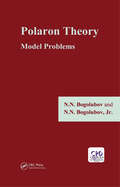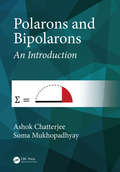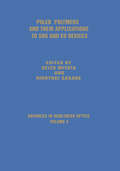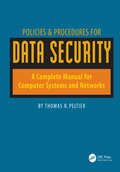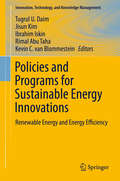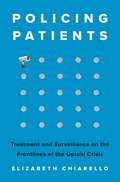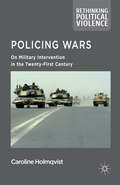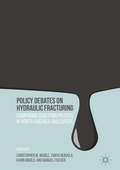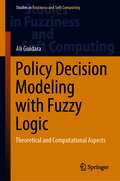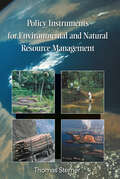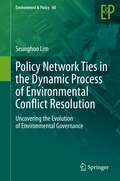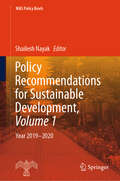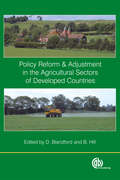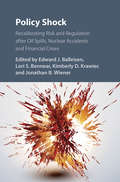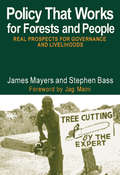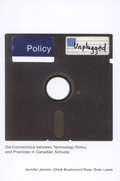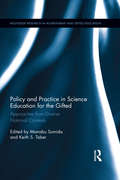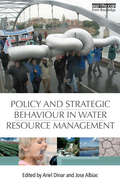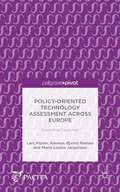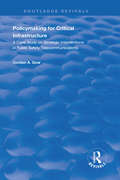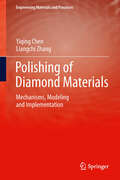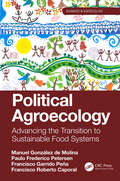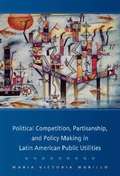- Table View
- List View
Polaron Theory: Model Problems
by N. N. Bogolubov Jr.Beginning with an introduction to the T-product approach in the theory of a particle interacting with bosonic fields as applied, for example, to the linearized polaron model, the book goes on to deal with the equilibrium state objective being to derive Bogolubov's inequality for the reduced free energy of the polaron. The third chapter deals with s
Polarons and Bipolarons: An Introduction (Chapman & Hall Pure and Applied Mathematics)
by Ashok Chatterjee Soma MukhopadhyayThis book provides a comprehensive review of the subject of polaron and a thorough account of the sophisticated theories of the polaron. It explains the concept of the polaron physics in as simple a manner as possible and presents the theoretical techniques and mathematical derivations in great detail. Anybody who follows this book will develop a solid command over the subject both conceptually and technically and will be in a position to contribute to this field.
Poled Polymers and Their Applications to SHG and EO Devices
by Seizo Miyata Hiroyuki SasabePoled polymers doped with nonlinear optically active chromophores combine the large second order nonlinearity of the dopant dye molecules with the optical quality of the polymer. The material design flexibility afforded to doped polymers makes them attractive in a large variety of devices and applications. This book addresses the critical science and technology issues in the development and application of poled polymers, with an emphasis on the stabilization of poled polymers and their special applications to second harmonic generation (SHG) and electro-optic (EO) devices.
Policies & Procedures for Data Security: A Complete Manual for Computer Systems and Networks
by Thomas PeltierHere‘s your how-to manual for developing policies and procedures that maintain the security of information systems and networks in the workplace. It provides numerous checklists and examples of existing programs that you can use as guidelines for creating your own documents.You‘ll learn how to identify your company‘s overall
Policies and Programs for Sustainable Energy Innovations
by Jisun Kim Tugrul U. Daim Ibrahim Iskin Rimal Abu Taha Kevin C. van BlommesteinThis volume features research and case studies across a variety of industries to showcase technological innovations and policy initiatives designed to promote renewable energy and sustainable economic development. The first section focuses on policies for the adoption of renewable energy technologies, the second section covers the evaluation of energy efficiency programs and the final section provides evaluations of energy technology innovations. Environmental concerns, energy availability and political pressure have prompted governments to look for alternative energy resources that can minimize the undesirable effects for current energy systems. For example, shifting away from the conventional fuel resources and increasing the percentage of electricity generated from renewable resources, such as solar and wind power, is an opportunity to guarantee lower CO2 emissions and to create better economic opportunities for citizens in the long run. Including discussions of such of timely topics and issues as global warming, bio-fuels and nuclear energy, the editors and contributors to this book provide a wealth of insights and recommendations for sustainable energy innovations.
Policing Patients: Treatment and Surveillance on the Frontlines of the Opioid Crisis
by Elizabeth ChiarelloA book that takes you inside the culture of surveillance that pits healthcare providers against their patientsDoctors and pharmacists make critical decisions every day about whether to dispense opioids that alleviate pain but fuel addiction. Faced with a drug crisis that has already claimed more than a million lives, legislatures, courts, and policymakers have enlisted the help of technology in the hopes of curtailing prescriptions and preventing deaths. This book reveals how this &“Trojan horse&” technology embeds the logics of surveillance in the practice of medicine, forcing care providers to police their patients while undermining public trust and doing untold damage to those at risk.Elizabeth Chiarello draws on hundreds of in-depth interviews with physicians, pharmacists, and enforcement agents across the United States to take readers to the frontlines of the opioid crisis, where medical providers must make difficult choices between treating and punishing the people in their care. States now employ prescription drug monitoring programs capable of tracking all controlled substances within a state and across state lines. Chiarello describes how the reliance on these databases blurs the line between medicine and criminal justice and pits pain sufferers against people with substance-use disorders in a zero-sum game.Shedding critical light on this brave new world of healthcare, Policing Patients urges medical providers to reaffirm their roles as healers and proposes invaluable policy solutions centered on treatment, prevention, and harm reduction.
Policing Wars
by Caroline HolmqvistHolmqvist presents an original account of the relationship between war and policing in the twenty first century. This interdisciplinary study of contemporary Western strategic thinking reveals how, why, and with what consequences, the wars in Afghanistan and Iraq became seen as policing wars.
Policy Debates on Hydraulic Fracturing
by Tanya Heikkila Christopher M. Weible Karin Ingold Manuel FischerThis edited volume compares seven countries in North America and Europe on the highly topical issue of oil and gas development that uses hydraulic fracturing or "fracking. " The comparative analysis is based on the Advocacy Coalition Framework (ACF) and guided by two questions: First, in each country, what are current coalitions and the related policy output? Second, based on the current situation, what are the chances for future policy change? This book is the first to use a social science approach to analyze hydraulic fracturing debates and the first application of the ACF that is deliberately comparative. The contributions in this book advance our understanding about the formation of coalitions and development of public policy in the context of different forms of government and economically recoverable natural resources.
Policy Decision Modeling with Fuzzy Logic: Theoretical and Computational Aspects (Studies in Fuzziness and Soft Computing #405)
by Ali GuidaraThis book introduces the concept of policy decision emergence and its dynamics at the sub systemic level of the decision process. This level constitutes the breeding ground of the emergence of policy decisions but remains unexplored due to the absence of adequate tools. It is a nonlinear complex system made of several entities that interact dynamically. The behavior of such a system cannot be understood with linear and deterministic methods.The book presents an innovative multidisciplinary approach that results in the development of a Policy Decision Emergence Simulation Model (PODESIM). This computational model is a multi-level fuzzy inference system that allows the identification of the decision emergence levers.This development represents a major advancement in the field of public policy decision studies. It paves the way for decision emergence modeling and simulation by bridging complex systems theory, multiple streams theory, and fuzzy logic theory.
Policy Diffusion Dynamics in America
by Graeme BousheyPolicy Diffusion Dynamics in America integrates research from agenda setting and epidemiology to model factors that shape the speed and scope of public policy diffusion. Drawing on a data set of more than 130 policy innovations, the research demonstrates that the "laboratories of democracy" metaphor for incremental policy evaluation and emulation is insufficient to capture the dynamic process of policy diffusion in America. A significant subset of innovations trigger outbreaks - the extremely rapid adoption of innovation across states. The book demonstrates how variation in the characteristics of policies, the political and institutional traits of states, and differences among interest group carriers interact to produce distinct patterns of policy diffusion.
Policy Instruments for Environmental and Natural Resource Management
by Thomas Professor SternerAs Thomas Sterner points out, the economic 'toolkit' for dealing with environmental problems has become formidable. It includes taxes, charges, permits, deposit-refund systems, labeling, and other information disclosure mechanisms. Though not all these devices are widely used, empirical application has started within some sectors, and we are beginning to see the first systematic efforts at an advanced policy design that takes due account of market-based incentives. Sterner?s book encourages more widespread and careful use of economic policy instruments. Intended primarily for application in developing and transitional countries, the book compares the accumulated experiences of the use of economic policy instruments in the U.S. and Europe, as well as in select rich and poor countries in Asia, Africa, and Latin America. Ambitious in scope, the book discusses the design of instruments that can be employed in a wide range of contexts, including transportation, industrial pollution, water pricing, waste, fisheries, forests, and agriculture. Policy Instruments for Environmental and Natural Resource Management is deeply rooted in economics but also informed by perspectives drawn from political, legal, ecological, and psychological research. Sterner notes that, in addition to meeting requirements for efficiency, the selection and design of policy instruments must satisfy criteria involving equity and political acceptability. He is careful to distinguish between the well-designed plans of policymakers and the resulting behavior of society. A copublication of Resources for the Future, the World Bank, and the Swedish International Development Cooperation Agency (Sida).
Policy Network Ties in the Dynamic Process of Environmental Conflict Resolution: Uncovering the Evolution of Environmental Governance (Environment & Policy #60)
by Seunghoo LimExtensive previous research has investigated environmental conflict management issues in networked settings and the design of policy networks, but the emergence and evolution of self-organizing policy networks are still not fully understood. Especially misunderstood is the problem of how the multiple motivations or incentives of competing policy actors in conflictual situations affect their structures of interaction, as this issue has not been studied systematically. This book aims to address the following research questions: how do policy stakeholders cope strategically with collective action or environmental conflict resolution? How do they utilize or maintain formal and informal policy networks to resolve problems effectively? What motivates them to engage or be involved in collaborative or conflictual networks? What influences their networking or their decisions on partner selection for conflict resolution? This book consists of four studies. The goal of the first study is to examine the form of a policy network by focusing on how policy networks emerge and evolve at the micro-level to solve collective action dilemmas endemic to decentralized and democratized policy decision-making processes, particularly in the environmental conflict resolution arena. The goal of the second study is to examine the main policy actors and structural characteristics of network governance evolution in the dynamic process of environmental conflict resolution. The goal of the third study is to highlight the role of policy tie formality in the evolution of multiplex ties in the environmental conflict resolution process. The goal of the fourth study is to demonstrate the relationships between patterns of interactions among policy actors and their modified and adjusted strategic behaviours within policy networks and across advocacy coalitions.
Policy Recommendations for Sustainable Development, Volume 1: Year 2019_2020 (NIAS Policy Briefs)
by Shailesh NayakThe book contains policy-related publications based on research conducted by the National Institute of Advanced Studies. These publications address and support sustainable development goals, such as energy and the environment, education, inequality, human development, and peace research, among others. This volume fosters comprehensive research focused on these global targets and endeavors to address some of society's greatest grand challenges. The book will be extremely beneficial for researchers, academicians, practitioners, and policymakers working in the areas of the 17 Sustainable Development Goals (SDGs).
Policy Reform and Adjustments in the Agricultural Sectors of Developed Countries
by David Blandford Berkeley HillThis book explores the policy implications of growing pressures for economic adjustment in the agricultural sectors of developed countries. The primary focus is on Europe and North America, but adjustment policies in other developed countries are discussed. Some chapters are based on an international workshop at Imperial College, London in October 2003, and an international symposium in Philadelphia in the spring of 2004.
Policy Shock: Recalibrating Risk and Regulation after Oil Spills, Nuclear Accidents and Financial Crises
by Edward J. Kimberly D. Balleisen Bennear Lori S. Krawiec Wiener Jonathan B.Policy Shock examines how policy-makers in industrialized democracies respond to major crises. After the immediate challenges of disaster management, crises often reveal new evidence or frame new normative perspectives that drive reforms designed to prevent future events of a similar magnitude. Such responses vary widely - from cosmetically masking inaction, to creating stronger incentive systems, requiring greater transparency, reorganizing government institutions and tightening regulatory standards. This book situates post-crisis regulatory policy-making through a set of conceptual essays written by leading scholars from economics, psychology and political science, which probe the latest thinking about risk analysis, risk perceptions, focusing events and narrative politics. It then presents ten historically-rich case studies that engage with crisis events in three policy domains: offshore oil, nuclear power and finance. It considers how governments can prepare to learn from crisis events - by creating standing expert investigative agencies to identify crisis causes and frame policy recommendations.
Policy That Works for Forests and People: Real Prospects for Governance and Livelihoods
by Stephen Bass James MayersSince its original publication by the International Institute for Environment and Development in 1999, Policy That Works for Forests and People has been recognised as the most authoritative study to date of policy processes that affect forests and people. Providing a thorough analysis of the issues, options and factors that determine different outcomes and bolstered by a major annex containing tools and tactics, the book offers clear and practical advice on how to formulate, manage and implement policies appropriate to different contexts. These are policies that result in real improvements in the governance, use and economic benefits that can flow from forests to those who depend upon them. This book is essential reading for policy-makers, forestry practitioners and academics and students in all areas of forest policy, management and governance.
Policy Unplugged
by Jennifer Jenson Chloë Brushwood Rose Brian LewisThe authors conducted a two-year study on the implementation of computer technologies, including in-depth interviews and classroom observation at thirty-two elementary and secondary schools across Canada. Based on this research, Policy Unplugged explores the intersections and disconnections between provincial technology policy, school board policy, and school-based practices. The authors consider the ways in which technology policy has become "unplugged" from daily experience, showing that teachers, students, and administrators are part of complex pedagogical and social systems that have been badly served by the enforced and hasty introduction of technology. They also show how small, often unquestioned practices and power relations in schools can create seemingly insurmountable impediments to technological implementation.
Policy and Practice in Science Education for the Gifted: Approaches from Diverse National Contexts (Routledge Research in Achievement and Gifted Education)
by Manabu Sumida Keith S TaberGifted education has come to be regarded as a key national programme in many coutnries, and gifted education in science disciplines is now being recognised to be of major importance for economic and technological development. Despite these initiatives and developments internationally, there are very few discussions on gifted education in science drawing upon practices and experiences in different national contexts. In support of an international dialogue between researchers and practitioners, often working within isolated traditions, this book offers information on key influential approaches to science education for gifted learners and surveys current policy and practice from a diverse range of educational contexts. The volume offers an informative introduction for those new to studying gifted science education, as well as supporting the development of the field by offering examples of critical thinking about key issues, and accounts of the influences at work within education systems and the practical complexities of providing science education for the gifted. The contributions draw upon a variety of research approaches to offer insights into the constraints and affordancxes of working within particular policy contexts, and the strengths and challenges inherent in different approaches to practice. Chapters include: Teaching science to the gifted in English state schools: locating a compromised 'gifted & talented' policy within its systemic context Models of education for science talented adolescents in the United States: Past, present, and likely future trends Navigating the shifting terrain between policy and practice for gifted learners in Tanzania Science education for female indigenous gifted students in the Mexican context Gifted Science Education in the Context of Japanese Standardization This book will appeal to scholars, practitioners and policy makers who are in the field of gifted science education.
Policy and Strategic Behaviour in Water Resource Management
by Ariel Dinar Jose AlbiacWater resource management throughout the world is a very complicated issue, involving various aspects and dimensions and a well-coordinated set of policies. A well-designed water policy is a multi-faceted concerted intervention, which could be specific to just one set of political and physical socio-economic conditions. A framework to analyse the interaction between policy design and implementation can assist in improving both of these in various physical, economic and political situations. This book focuses on the interaction between policy making and strategic behaviour of policy makers, water users and other stakeholders, and how policy analysis and other analytical tools from the field of game theory and negotiation can improve policy design. The book presents analysis by high-level policy makers and policy analysts from various countries, to share experience regarding specific policy issues that are relevant to almost any country in the world, but may have been addressed differently in each country.
Policy-Oriented Technology Assessment Across Europe: Expanding Capacities
by Lars Klüver Rasmus Øjvind Nielsen Marie Louise JørgensenPolicy-Oriented Technology Assessment Across Europe.
Policymaking for Critical Infrastructure: A Case Study on Strategic Interventions in Public Safety Telecommunications (Routledge Revivals)
by Gordon A. GowOriginally published in 2005. By weaving together three distinct fields - public policy, technology studies and management of critical infrastructure - this volume shows how public policy can help to improve the management of large technical systems. A much-needed analytical framework, based on approaches drawn from established work in science and technology studies, is applied to a case study of the development of a new public safety service for mobile telephones. This example of emerging growth and change in critical infrastructure allows Gordon Gow to identify current problem areas and to refine a more general set of strategies aimed at improving public policy processes in the management of technology. The work also discusses a range of contemporary issues in telecom policy and regulation, such as public consultation, technical standards, network unbundling and interconnection. This insightful work provides observations and recommendations for policy makers, regulators, industry and consumer groups alike, furthering the improved coordination of efforts across these domains of interest.
Polishing of Diamond Materials
by Yiqing Chen Liangchi ZhangDiamond has a unique combination of properties, such as the highest hardness and thermal conductivity among any known material, high electrical resistivity, a large optical band gap and a high transmission, good resistance to chemical erosion, low adhesion and friction, and extremely low thermal expansion coefficient. As such, diamond has been a desirable material in a wide range of applications in mechanical, chemical, optical, thermal and electrical engineering. In many of the cases, the surface of a diamond component or element must have a superior finish, often down to a surface roughness of nanometers. Nevertheless, due to its extreme hardness and chemical inertness, the polishing of diamond and its composites has been a sophisticated process. Polishing of Diamond Materials will provide a state-of-the-art analysis, both theoretically and experimentally, of the most commonly used polishing techniques for mono/poly-crystalline diamond and chemical vapour deposition (CVD) diamond films, including mechanical, chemo-mechanical, thermo-chemical, high energy beam, dynamic friction and other polishing techniques. The in-depth discussions will be on the polishing mechanisms, possible modelling, material removal rate and the quality control of these techniques. A comparison of their advantages and drawbacks will be carried out to provide the reader with a useful guideline for the selection and implementation of these polishing techniques. Polishing of Diamond Materials will be of interest to researchers and engineers in hard materials and precision manufacturing, industry diamond suppliers, diamond jewellery suppliers and postgraduate students in the area of precision manufacturing.
Political Agroecology: Advancing the Transition to Sustainable Food Systems (Advances in Agroecology)
by Manuel González de Molina Paulo Frederico Petersen Francisco Garrido Peña Francisco Roberto CaporalPolitical Agroecology is the first book to offer a systematic and articulated reflection on Political Agroecology from the Agroecological perspective. It defines the disciplinary field responsible for designing and producing actions, institutions and regulations aimed at achieving agrarian sustainability. In short, it aims to build a political theory that makes the scaling-up of agroecological experiences possible, turning them into the foundation of a new and alternative food regime. The book proposes theoretical, practical and epistemological foundations of a new theoretical and practical field of work for agroecologists: Political Agroecology. It establishes a framework for a common agroecological strategy, covering the different levels of collective action and the different instruments with which it can be developed. This will be essential reading for agroecologists, environmentalists, farming and food communities, and an ideal textbook for advanced agroecology courses in universities. Key features: Offers a unique state of the art on this fundamental new topic: Political Agroecology Presents a complete introduction to the political and institutional aspects of Agroecology, covering the whole food system Offers an important tool for searching agrarian sustainability Provides a broad epistemological, theoretical and methodological focus, exploring the connection between the different levels and scales involved in agroecological theory and practice
Political Competition, Partisanship, and Policy Making in Latin American Public Utilities
by Maria Victoria MurilloThis book studies policymaking in the Latin American electricity and telecommunication sectors. Murillo's analysis of the Latin American electricity and telecommunications sectors shows that different degrees of electoral competition and the partisan composition of the government were crucial in resolving policymakers' tension between the interests of voters and the economic incentives generated by international financial markets and private corporations in the context of capital scarcity. Electoral competition by credible challengers dissuaded politicians from adopting policies deemed necessary to attract capital inflows. When electoral competition was low, financial pressures prevailed, but the partisan orientation of reformers shaped the regulatory design of market-friendly reforms. In the post-reform period, moreover, electoral competition and policymakers' partisanship shaped regulatory redistribution between residential consumers, large users, and privatized providers.
Political Descent: Malthus, Mutualism, and the Politics of Evolution in Victorian England
by Piers J. HaleHistorians of science have long noted the influence of the nineteenth-century political economist Thomas Robert Malthus on Charles Darwin. In a bold move, Piers J. Hale contends that this focus on Malthus and his effect on Darwin’s evolutionary thought neglects a strong anti-Malthusian tradition in English intellectual life, one that not only predated the 1859 publication of the Origin of Species but also persisted throughout the Victorian period until World War I. Political Descent reveals that two evolutionary and political traditions developed in England in the wake of the 1832 Reform Act: one Malthusian, the other decidedly anti-Malthusian and owing much to the ideas of the French naturalist Jean Baptiste Lamarck. These two traditions, Hale shows, developed in a context of mutual hostility, debate, and refutation. Participants disagreed not only about evolutionary processes but also on broader questions regarding the kind of creature our evolution had made us and in what kind of society we ought therefore to live. Significantly, and in spite of Darwin’s acknowledgement that natural selection was "the doctrine of Malthus, applied to the whole animal and vegetable kingdoms,” both sides of the debate claimed to be the more correctly "Darwinian. ” By exploring the full spectrum of scientific and political issues at stake, Political Descent offers a novel approach to the relationship between evolution and political thought in the Victorian and Edwardian eras.
